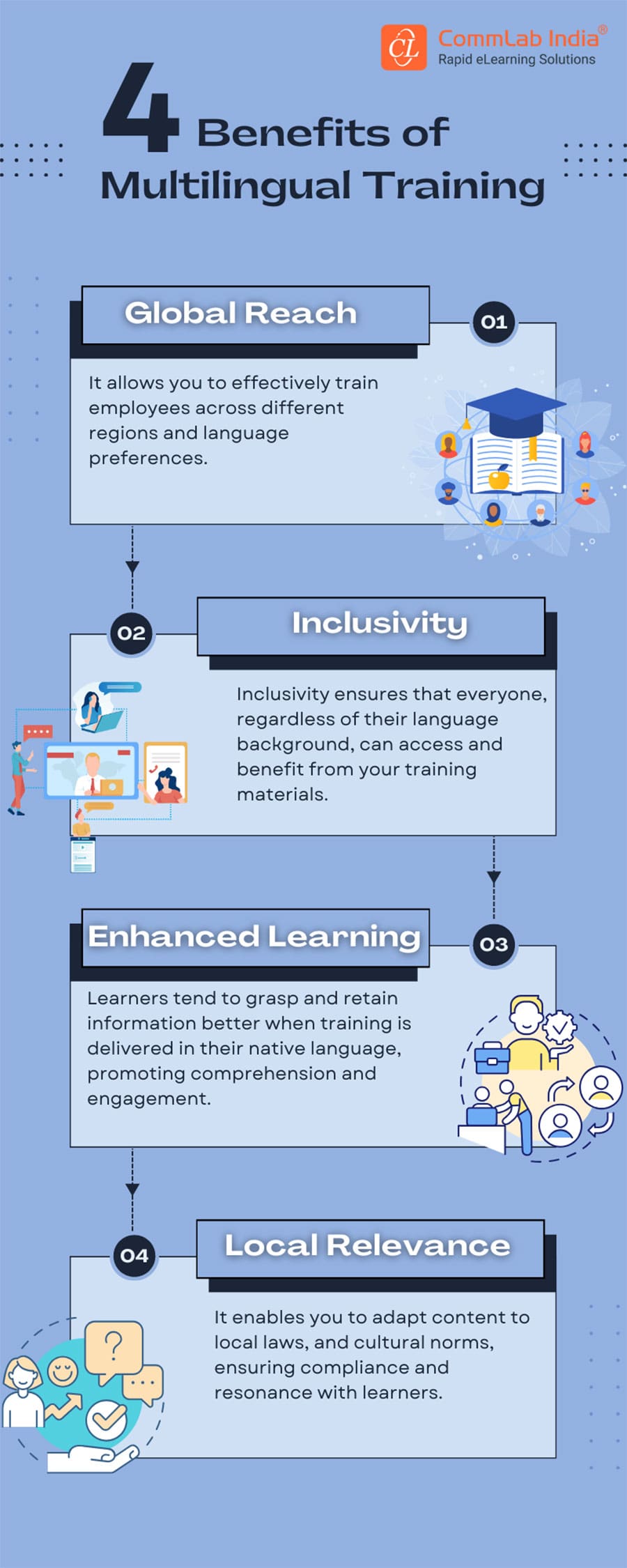eLearning Translations for Effective Multilingual Corporate Training [Infographic]
eLearning translations are the catalyst for promoting more informed, collaborative corporate training where learning knows no language bounds.

Multilingual training is essential in corporate settings, particularly for multinational organizations. It ensures that training content is accessible to employees from diverse linguistic backgrounds. And a great way to ensure effective corporate training for learners who prefer a variety of languages in learning is through eLearning translations. This enhances inclusivity, and overall effectiveness in corporate learning, fostering a more harmonious and effective work environment.
Relevance of Multilingual Training Today
In a global landscape today, where we have access to a workforce from around the globe, language can either be a hindrance or a tool for seamless learning. As global corporations, it is crucial to recognize the significance of using multiple languages to ensure effective corporate training. The best way to accomplish this is to incorporate their preferred languages in training with eLearning translations.
→ Access Tool: Multilingual Wrapper
Consider a multinational corporation with a workforce all over the world. In this scenario, providing training in only one language, such as English, may not effectively reach all employees, particularly those whose first language is not English. Here, eLearning translations for multilingual training enable the organization to ensure that all employees, regardless of their native language, have access to and understand the training content.
Take a peek at this captivating infographic showcasing the advantages of multilingual training.
How eLearning Translations Ensure Effective Multilingual Corporate Training
Expanded Reach
Organizations can provide training to employees from various linguistic backgrounds thanks to eLearning translations. Employees in various regions can now access and relate to corporate training materials. This inclusiveness ensures that all employees, regardless of their native language, can actively engage with training content, resulting in increased participation, learning, and, ultimately, knowledge retention.
Training Consistency
Training materials can be accurately and consistently conveyed in different languages using eLearning translations. This means that regardless of the organization's linguistic diversity, everyone receives the same core training. This consistency not only ensures that employees all over the world are on the same page, but it also allows everyone to share a common understanding of the training content and objectives.
Competitive Advantage
Leveraging eLearning translations caters to the learning needs of a diverse talent pool. Multilingual training showcases an organization’s willingness to meet employee training needs where they are and make them feel valued and heard. Organizations that provide consistent, multilingual training materials are also better equipped to navigate the complexities of global markets and industry standards.
Personalized Learning Paths
By tailoring training content to specific regions, departments, or individual learner preferences. Employees believe that their training is tailored to their specific needs, which boosts motivation and improves learning outcomes. Personalized learning paths with eLearning translations empower organizations to deliver training that is flexible, relevant, and more aligned with the distinct needs of each learner or group.
Bringing it All Together
Although offering training in multiple languages is crucial but managing various versions of eLearning translation courses can be a daunting task. But worry not! Because we've got you covered with Multilingual Wrapper's flexibility and ease of use, all without any programming experience! You don’t want to miss using this useful tool to ease the task of hosting eLearning translations on your LMS, trust me!
Avoid the hassle of assigning and managing the eLearning translations on the LMS with our easy-to-use multilingual wrapper!







